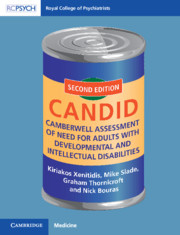Book contents
- Camberwell Assessment of Need for Adults with Developmental and Intellectual Disabilities
- Camberwell Assessment of Need for Adults with Developmental and Intellectual Disabilities
- Copyright page
- Contents
- Acknowledgements for the First Edition
- Acknowledgements for the Second Edition
- Abbreviations
- Chapter 1 Introduction
- Chapter 2 Needs Assessment in Intellectual Disabilities Mental Health Services
- Chapter 3 Development and Use of CANDID
- Chapter 4 Using CANDID-S
- Chapter 5 Using CANDID-R
- Chapter 6 Training for CANDID
- Chapter 7 Guidance on Rating
- Book part
- References
- Index
Chapter 1 - Introduction
Published online by Cambridge University Press: 15 February 2021
- Camberwell Assessment of Need for Adults with Developmental and Intellectual Disabilities
- Camberwell Assessment of Need for Adults with Developmental and Intellectual Disabilities
- Copyright page
- Contents
- Acknowledgements for the First Edition
- Acknowledgements for the Second Edition
- Abbreviations
- Chapter 1 Introduction
- Chapter 2 Needs Assessment in Intellectual Disabilities Mental Health Services
- Chapter 3 Development and Use of CANDID
- Chapter 4 Using CANDID-S
- Chapter 5 Using CANDID-R
- Chapter 6 Training for CANDID
- Chapter 7 Guidance on Rating
- Book part
- References
- Index
Summary
The Camberwell Assessment of Need for Adults with Developmental and Intellectual Disabilities (CANDID) is introduced. It was developed at the Institute of Psychiatry, Psychology and Neuroscience, King’s College London in 1999, and published in book form in 2003. It was developed by modification of the Camberwell Assessment of Need (CAN), the most widely used needs assessment approach for people with severe mental health problems. In addition to CANDID, a number of other variants of CAN have been developed including needs assessment for forensic patients, for mothers and pregnant women, for older adults and for people in disaster and relief situations. In this 2nd edition, the need rating for the presence or absence of need and met or unmet needs is discussed. In addition, a need rating algorithm has been introduced. Both changes are in line with changes in the 2nd edition CAN. Moreover, the terminology in this 2nd edition has changed to reflect terminology used in contemporary intellectual disabilities services.
Keywords
- Type
- Chapter
- Information
- Camberwell Assessment of Need for Adults with Developmental and Intellectual DisabilitiesCANDID, pp. 1 - 2Publisher: Cambridge University PressPrint publication year: 2021

